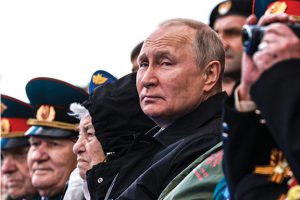Bloomberg
Nearly three months after Vladimir Putin sent his troops into Ukraine, Russia faces more sanctions than any other country. But thanks to surging prices for its exports of oil and gas, the Kremlin has been able to steady the ruble and limit the impact on consumers and the war effort. For now.
Signs of strain are spreading across the economy, from the shuttered stores of foreign brands that fled to steep plunges in car sales, mortgage applications and many tax collections. Though they won’t say so publicly, Finance Ministry officials have foreseen the biggest economic contraction in a generation this year as sanctions starve companies of key components, technologies and capital.
While that slow-motion shock still may not be enough to force Putin to change course over Ukraine, the economic pressure on the Kremlin is set to rise sharply later this year, particularly with the European Union now discussing an embargo on Russian oil.
“Sanctions alone would not stop Putin’s war, but sanctions combined with the military pressure puts him in a difficult position,†said Daniel Fried, a former top US State Department official.
So far, it’s the steady flow of weapons and other assistance for Kyiv that’s had the most decisive impact in helping Ukraine repulse Russian attacks. Kremlin officials admit privately that they didn’t expect the US and its allies to move so quickly to offer Ukraine such broad support.
Putin isn’t concerned about the economic cost, these people said, as he pursues what he views as an existential struggle for Russia’s geopolitical survival with the US and its allies.
“The economy has ceased to be a source of legitimacy for him,†said Sergei Guriev, a Paris-based Russian economist who’s advocated tougher sanctions. “To force him to think about the economy, you’d have to impose an oil-and-gas embargo.â€
That’s a tall order, especially given Europe’s dependence on Russian fuels, but oil restrictions are under active discussion. “All of us share the objective of diminishing the revenues that Russia will have to buy goods and services to help their economy and enable them to wage war,†US Treasury Secretary Janet Yellen said ahead of a gathering of Group of Seven finance chiefs. “We’re doing a lot of things that are effective in diminishing their access to the goods and services they need.â€
Russia managed to limit the initial fallout at the beginning of the war, heading off a financial crisis by hiking interest rates and imposing strict restrictions on taking money out of the country after the US and its allies sanctioned the central bank and its $600 billion war chest.
But while Putin brags that Russia is “confidently coping†with the impact of sanctions, touting the the ruble’s rebound from the lows hit shortly after the invasion, his own officials aren’t as upbeat.
A central bank report said the ruble’s rally is in fact a reflection of the impact of sanctions, not the opposite.
The restrictions, combined with foreign companies cutting off business with Russia, caused imports to drop, the bank said. As a result, demand for foreign-exchange has all but dried up in a market where capital controls had banned other would-be buyers from participating.
A poll released by Bank Otkritie found 58% of Russians said they’d noticed shortages of foods in stores since the war started, and a third said they’re stocking up. Another survey by the independent Levada Center, found 85% of those surveyed said now is a bad time for big purchases or taking out a loan, the highest level in more than a decade.
 The Gulf Time Newspaper One of the finest business newspapers in the UAE brought to you by our professional writers and editors.
The Gulf Time Newspaper One of the finest business newspapers in the UAE brought to you by our professional writers and editors.
